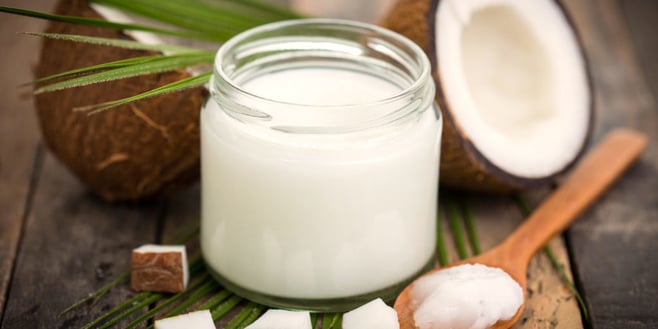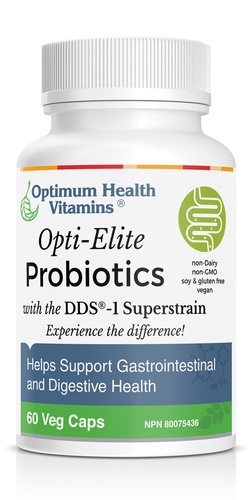 Coconut oil provides numerous health benefits, but one with a double-edge is its antimicrobial properties. This has many asking "Does coconut oil kill probiotics?" And the answer is important, even though it is not straightforward.
Coconut oil provides numerous health benefits, but one with a double-edge is its antimicrobial properties. This has many asking "Does coconut oil kill probiotics?" And the answer is important, even though it is not straightforward.
In a nutshell: Coconut oil is rich in medium-chain triglycerides,(MCTs), that are antibacterial, and can cause a die-off in your intestines. If your gut is dysbiotic, (i.e. undesirable bacteria are dominant), bacterial fragments released called LPS can then cause major immune responses, and create a lot of inflammation in your gut, and elsewhere in the body. The best way to prevent this is to take steps to build-up a healthy intestinal population of good bacteria, which creates a barrier, and blunts gut reactivity. A good probiotic supplement can be extremely helpful in achieving this.
When it comes to what bacteria are residing in your gut, all of us have what are termed "gram-positive" and "gram-negative" bacteria. In general, the gram positive bacteria are the good guys, such as probiotics, and most (but not all) pathogenic, disease-causing bacteria, are gram-negative. [1]
When the right bacteria are dominant, your gut lining is well protected by a healthy barrier. As a result, your gut-associated immune-reactivity is low, as are levels of inflammation, since your intestinal cells are receiving "friendly" signals. Immune-protective substances are produced, and your intestinal lining does a good job of selectively absorbing desirable nutrients, and preventing noxious substances from contacting your gut lining, or entering your bloodstream.
On the other hand, the gut is very good at recognizing certain patterns present in the cell membranes of pathogenic gram-negative bacteria, called "lipopolysaccharides" or LPS. When unfriendly, gram-negative bacteria, and a lot of LPS are present the gut barrier can break down, and the intestinal epithelial cells mount an immune response, becoming reactive and inflamed.
So here's the rub regarding coconut oil
Although it has many healthy characteristics, such as supporting your energy and metabolism, due to coconut oil's high concentration of medium chain triglycerides, or MCTs, it is quite antimicrobial killing both gram-positive and gram-negative bacteria. [6] [7]
Be clear that I am not trying to villify coconut oil, or recommending not to use it, but studies have shown that coconut oil along with other saturated fats, increases LPS levels in the blood after consumption.[7] Omega-3 oils, such as fish or cod-liver, on the other hand decrease circulating LPS levels. And olive or vegetable oils have essentially no effect. [7]
LPS are largely what causes a “leaky gut”
The inflammation from LPS causes your intestinal cells to spread apart, losing their tight connections with each other, and your gut-lining can become leaky. A leaky gut allows LPS, and bacteria to pass into our body that would normally be kept out. Passage of LPS into our bloodstream then causes systemic immune responses, many of which are are organ-specific and highly damaging. [2] Hence, preventing excessive LPS from entering your circulation through the gut is of immense consequence.
(This process is called "endotoxemia"...think of toxins from within entering the blood...and it can be a root-cause of a countless array of health problems, as the inflammation that is created can negatively impact our organs, such as the heart, brain and liver. It can affect metabolism, mood, energy, and eating patterns. It can create pain and anxiety, hormonal imbalances, and particularly auto-immunity, where your body starts attacking itself. In fact, endotoxemia can contribute to, and worsen almost every inflammatory chronic condition currently ravaging modern society, including insulin resistance and obesity.) [2-5]
So, despite coconut oil's plethora of positive properties, if you have been on antibiotics, or have a lot of digestive complaints, (i.e. your intestinal flora is disrupted), you may be wise to add an omega-3 fish oil, and/or start slowly when consuming coconut oil... or avoiding it until you have re-established a health intestinal flora.
In addition to many positive results we have seen from coconut oil, the tendency to increase LPS may explain some of the negative responses we have witnessed in our clients over the years... (including "bowel urgency"!) Yet, I wouldn't get phobic about coconut oil either, given that human breast milk is also high in MCTs! [8] In many circumstances, it’s antimicrobial properties can be very beneficial.
 Overall, it’s all about balance. We all have some level of circulating LPS in our bloodstream, yet one of the most important aspects of maintaining that balance is to make sure you have a healthy gut flora to protect you from this toxic by-product of digestion.
Overall, it’s all about balance. We all have some level of circulating LPS in our bloodstream, yet one of the most important aspects of maintaining that balance is to make sure you have a healthy gut flora to protect you from this toxic by-product of digestion.
In this regard, there is a reason I have been using and recommending probiotics containing the DDS-1 strain of L. acidophilus, along with Bifidobacterium since 1993....they work! These probiotics help to enhance gut-function, not only calming and supporting healthy digestion, but also by decreasing allergies and gut-immune system reactivity. [9]
This is something I have covered in this past article - What Do Probiotic Supplements Do For Allergies?
In general, probiotics reduce systemic inflammation, and with 40 years of research behind it, the DDS-1 strain of probiotic is one of the most effective. [10-11]
So this is another reason to ensure you are consuming probiotics from fermented foods or a high-quality supplement, i.e. to offset the potentially negative effect of LPS, including the increased levels caused by coconut oil and MCTs. This way you can get their benefits, without the detriment.
Until next time,
Continue to be well!
John

References
[1] https://www.ncbi.nlm.nih.gov/pmc/articles/PMC3579206/
[2] https://www.ncbi.nlm.nih.gov/pmc/articles/PMC4432792/
[3] https://www.ncbi.nlm.nih.gov/pmc/articles/PMC3448089/
[4] https://genomemedicine.biomedcentral.com/articles/10.1186/s13073-016-0303-2
[5] http://diabetes.diabetesjournals.org/content/56/7/1761
[6] https://www.ncbi.nlm.nih.gov/pubmed/19469285
[7] https://www.ncbi.nlm.nih.gov/pmc/articles/PMC3577458/
[8] http://www.coconut-oil-central.com/medium-chain-triglycerides.html
[9] https://www.ncbi.nlm.nih.gov/pubmed/20642296
[10] https://www.ncbi.nlm.nih.gov/pubmed/28054937
[11] http://www.teknoscienze.com/agro/pdf/dash_AF2_2010.pdf

